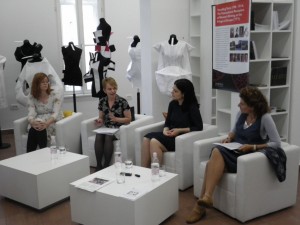Time flies and after our first meeting in Chawton a year ago and our spring meeting in Turku the TTT project hold a meeting in Ljubljana, hosted by the members of our Slovenian team – and, needless to say, we were taken care of like queens!
Each of our meetings has been particular in its own way – in Chawton and in Turku, we strengthened our cooperation with our Associated Partners (The Chawton House Library and The City Library in Turku). In Ljubljana and in the upcoming meeting next spring in Norway, we are concentrating on dissemination and a dialogue with contemporary women writers by means of participating at literary festivals. The Vilenica literary festival we participated in now in Ljubljana, has been focusing on transnational aspects of writing, “lesser known literatures” and “flow among languages” (as expressed by A. Blatnik, President of the Vilenica Jury), which is perfectly in tune with our Project. Though concentrating on the long 19th century, we are, of course, constantly reflecting on the way the literary field and the reception of women writers have developed throughout the 20th century and what the situation is today.
In cooperation with the organizers of the festival, Katja Mihurko Poniž arranged a programme “Meeting Literary Foremothers”, with participation of three transnational authors: Elsa Korneti (born in Germany, living in Greece), Dimitra Xidous (a Greek-Canadian living in Ireland), and Gabriela Babnik (born in Germany, living in Slovenia). The programme was opened by Katja Mihurko Poniž, then followed an introduction about the TTT project by Henriette Partzsch, after which we could listen to the results of a very interesting project carried out by the students from Gimnazija Nova Gorica (Nova Gorica Grammar School), presented by A. Šuligoj and K.M. Zavnik. The student project consisted in in-terviewing contemporary Slovene women writers about their ideas on gender issues in the contemporary literary life and their relationships to their literary foremothers. A wide range of opinions was presented: from those expressing a strong concern with the position of contemporary women writers to those emphasizing a need to transcend the gender difference, to concentrate on the universal aspects of literature and all art, to avoid any labels such as woman writer or feminist. The students’ presentation provided an excellent introduction to the Round Table with Elsa, Dimitra and Gabriela, which I had the pleasure to chair. It was fascinating to listen to the writers’ views on the issues above mentioned. Once again, we could hear how painfully gender matters still today, how important it can be for a young woman writer to find her foremothers and kindred female spirits across time and space, but, at the same time and from other points of view, how insignificant gender can be in creative expression. What rose to the forefront repeatedly was the necessity of contextualization, something we have been constantly emphasizing within Travelling TexTs: to be a woman writer in one country might be something com-pletely different than in another one, both in past and present.
